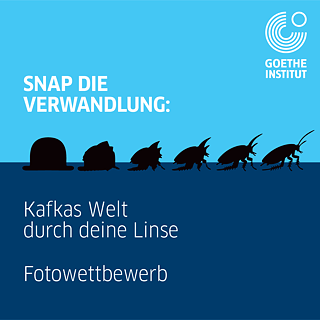You were asked to reproduce the central motif of The Metamorphosis photographically. You could stage a scene, create a symbolic representation or interpret the theme of transformation and identity in your very own way.
You had to work together in groups of two or three and produce a photo series of up to four photos documenting a transformation. The photos could be in black and white or colour. You had to write your own text in German of at least 150 and no more than 250 words about the creation of the photo series, your inspiration and motivation and how Kafka inspired you.
A jury has selected the best entries. There were great prizes for the winners.
The closing date for entries was 28 October 2024
Please consider the following:
- The photos could be in black and white or in colour.
- The photos coulc be in landscape or portrait format.
- The accompanying text had to be be in German.
- You could send us up to four individual photos or a series of up to four photos in JPEG format with a minimum resolution of 1,701 pixels on the shorter side and 2,551 pixels on the longer side.
- No AI-generated photos could be submitted!
